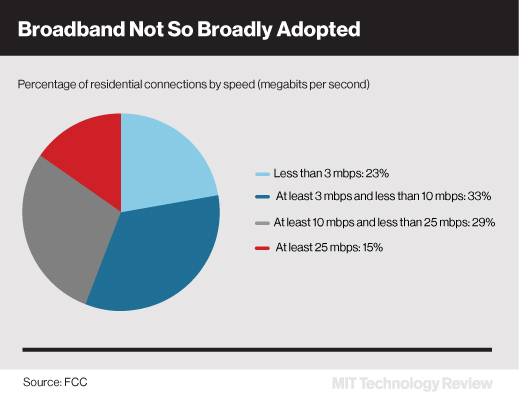You Might Not Have Broadband Anymore
If you don’t think your home Internet service is as fast as it ought to be, federal regulators are inclined to agree.
On Wednesday the U.S. Federal Communications Commission proposed new rules for regulating the Internet (see “FCC Chief Proposes Broader Net Neutrality Rules”), which the FCC says will help it ensure that Americans have access to “more and better broadband.” But due to a separate decision the FCC made last week to change its very definition of “broadband,” many fewer people even have it to begin with.
The new broadband standard calls for download speeds of 25 megabits per second (mbps) and upload speeds of three mbps—up from four and one, respectively. FCC chairman Tom Wheeler recently said 25 mbps is “fast becoming ‘table stakes’ in 21st century communications,” and the White House, in a recent report, called this speed the “baseline to get the full benefits of Internet access.” But as the FCC has also reported, only about 15 percent of residential connections had download speeds of at least 25 mbps at the end of 2013. Currently the average connection speed in the U.S. is 11.5 mbps, according to Akamai; more than three-fourths of residential connections are above three mbps, according to the FCC.

Even if you do buy broadband access, though, that doesn’t necessarily guarantee that you get it. A recent analysis by the independent research group Measurement Lab showed that between May 2013 and February 2014, many customers of big service providers including Comcast, Time Warner Cable, and Verizon often experienced download speeds of less than four mbps. This chart produced by the lab captures the dramatic plunge in bandwidth:

Measurement Lab concluded that this degradation of service was the result of business disputes between consumer ISPs like Comcast and Time Warner and companies, like Cogent and Level 3, which connect those consumer ISPs to the greater Internet. Specifically, the disagreements were over who should be obligated to pay for upgrades at interconnections between the companies’ networks. If the FCC’s proposed rules, which face a vote on February 26, are enacted, the agency for the first time will have the authority to police interconnection-related business dealings. The agency’s officials hope this and the other changes eventually mean that paying for broadband actually guarantees you very fast service.
Keep Reading
Most Popular
Large language models can do jaw-dropping things. But nobody knows exactly why.
And that's a problem. Figuring it out is one of the biggest scientific puzzles of our time and a crucial step towards controlling more powerful future models.
The problem with plug-in hybrids? Their drivers.
Plug-in hybrids are often sold as a transition to EVs, but new data from Europe shows we’re still underestimating the emissions they produce.
Google DeepMind’s new generative model makes Super Mario–like games from scratch
Genie learns how to control games by watching hours and hours of video. It could help train next-gen robots too.
How scientists traced a mysterious covid case back to six toilets
When wastewater surveillance turns into a hunt for a single infected individual, the ethics get tricky.
Stay connected
Get the latest updates from
MIT Technology Review
Discover special offers, top stories, upcoming events, and more.